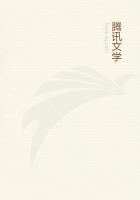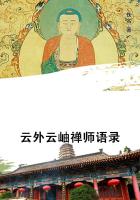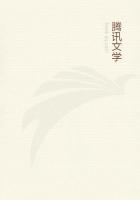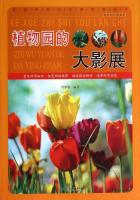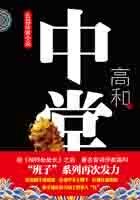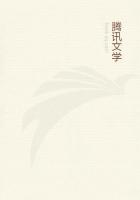Whether she was the female of a minnock (whatever that may be) or whether she was only a very well-meaning schoolmistress desirous of enlivening a monotonous existence, Miss Wilkes certainly took us out of ourselves a good deal. Did my Father know what danger he ran? It was the opinion of Miss Marks and of Mary Grace that he did not, and in the back-kitchen, a room which served those ladies as a private oratory in the summer-time, much prayer was offered up that his eyes might be opened ere it was too late. But I am inclined to think that they were open all the time, that, at all events, they were what the French call entr'ouvert, that enough light for practical purposes came sifted in through his eyelashes. At a later time, being reminded of Miss Wilkes, he said with a certain complaisance, 'Ah, yes! she proffered much entertainment during my widowed years!' He used to go down to her boarding-school, the garden of which had been the scene of a murder, and was romantically situated on the edge of a quarried cliff; he always took me with him, and kept me at his side all through these visits, notwithstanding Miss Wilkes' solicitude that the fatigue and excitement would be too much for the dear child's strength, unless I rested a little on the parlour sofa.
About this time, the question of my education came up for discussion in the household, as indeed it well might. Miss Marks had long proved practically inadequate in this respect, her slender acquirements evaporating, I suppose, like the drops of water under the microscope, while the field of her general duties became wider. The subjects in which I took pleasure, and upon which I possessed books, I sedulously taught myself; the other subjects, which formed the vast majority, I did not learn at all.
Like Aurora Leigh, I brushed with extreme flounce The circle of the universe, especially zoology, botany and astronomy, but with the explicit exception of geology, which my Father regarded as tending directly to the encouragement of infidelity. I copied a great quantity of maps, and read all the books of travels that I could find. But I acquired no mathematics, no languages, no history, so that I was in danger of gross illiteracy in these important departments.
My Father grudged the time, but he felt it a duty to do something to fill up these deficiencies, and we now started Latin, in a little eighteenth-century reading-book, out of which my Grandfather had been taught. It consisted of strings of words, and of grim arrangements of conjunction and declension, presented in a manner appallingly unattractive. I used to be set down in the study, under my Father's eye, to learn a solid page of this compilation, while he wrote or painted. The window would be open in summer, and my seat was close to it. Outside, a bee was shaking the clematis-blossom, or a red-admiral butterfly was opening and shutting his wings on the hot concrete of the verandah, or a blackbird was racing across the lawn. It was almost more than human nature could bear to have to sit holding up to my face the dreary little Latin book, with its sheepskin cover that smelt of mildewed paste.
But out of this strength there came an unexpected sudden sweetness. The exercise of hearing me repeat my strings of nouns and verbs had revived in my Father his memories of the classics.
In the old solitary years, a long time ago, by the shores of Canadian rapids, on the edge of West Indian swamps, his Virgil had been an inestimable solace to him. To extremely devout persons, there is something objectionable in most of the great writers of antiquity. Horace, Lucretius, Terence, Catullus, Juvenal,--in each there is one quality or another definitely repulsive to a reader who is determined to know nothing but Christ and him crucified. From time immemorial, however, it has been recognized in the Christian church that this objection does not apply to Virgil. He is the most evangelical of the classics; he is the one who can be enjoyed with least to explain away and least to excuse. One evening my Father took down his Virgil from an upper shelf, and his thoughts wandered away from surrounding things; he travelled in the past again. The book was a Delphin edition of 1798, which had followed him in all his wanderings; there was a great scratch on the sheep-skin cover that a thorn had made in a forest of Alabama. And then, in the twilight, as he shut the volume at last, oblivious of my presence, he began to murmur and to chant the adorable verses by memory.
Tityre, tu patulae recubans sub tegmine fagi, he warbled; and I stopped my play, and listened as if to a nightingale, until he reached tu, Tityre, lentus in umbra Formosam resonare doces Amaryllida silvan.
'Oh Papa, what is that?' I could not prevent myself from asking.
He translated the verses, he explained their meaning, but his exposition gave me little interest. What to me was beautiful Amaryllis? She and her love-sick Tityrus awakened no image whatever in my mind.
But a miracle had been revealed to me, the incalculable, the amazing beauty which could exist in the sound of verses. My prosodical instinct was awakened quite suddenly that dim evening, as my Father and I sat alone in the breakfast-room after tea, serenely accepting the hour, for once, with no idea of exhortation or profit. Verse, 'a breeze mid blossoms playing', as Coleridge says, descended from the roses as a moth might have done, and the magic of it took hold of my heart forever. Ipersuaded my Father, who was a little astonished at my insistence, to repeat the lines over and over again. At last my brain caught them, and as I walked in Benny's garden, or as Ihung over the tidal pools at the edge of the sea, all my inner being used to ring out with the sound of Formosam resonare doces Amaryllida silvan.

